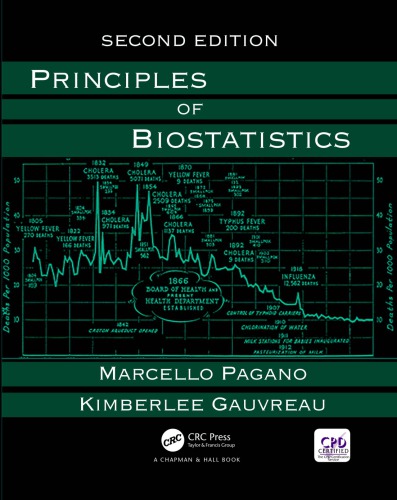

Most ebook files are in PDF format, so you can easily read them using various software such as Foxit Reader or directly on the Google Chrome browser.
Some ebook files are released by publishers in other formats such as .awz, .mobi, .epub, .fb2, etc. You may need to install specific software to read these formats on mobile/PC, such as Calibre.
Please read the tutorial at this link: https://ebookbell.com/faq
We offer FREE conversion to the popular formats you request; however, this may take some time. Therefore, right after payment, please email us, and we will try to provide the service as quickly as possible.
For some exceptional file formats or broken links (if any), please refrain from opening any disputes. Instead, email us first, and we will try to assist within a maximum of 6 hours.
EbookBell Team

4.3
38 reviewsThis edition is a reprint of the second edition published in 2000 by Brooks/Cole and then Cengage Learning.
Principles of Biostatistics is aimed at students in the biological and health sciences who wish to learn modern research methods. It is based on a required course offered at the Harvard School of Public Health. In addition to these graduate students, many health professionals from the Harvard medical area attend as well.
The book is divided into three parts. The first five chapters deal with collections of numbers and ways in which to summarize, explore, and explain them. The next two chapters focus on probability and introduce the tools needed for the subsequent investigation of uncertainty. It is only in the eighth chapter and thereafter that the authors distinguish between populations and samples and begin to investigate the inherent variability introduced by sampling, thus progressing to inference. Postponing the slightly more difficult concepts until a solid foundation has been established makes it easier for the reader to comprehend them.
The supplements include a manual for students with solutions for odd-numbered exercises, a manual for instructors with solutions to all exercises, and selected data sets.
Marcello Pagano is Professor of Statistical Computing in the Department of Biostatistics at the Harvard School of Public Health. His research in biostatistics is on computer intensive inference and surveillance methods that involve screening methodologies, with their associated laboratory tests, and in obtaining more accurate testing results that use existing technologies.
Kimberlee Gauvreau is Associate Professor in the Department of Biostatistics and Associate Professor of Pediatrics at Harvard Medical School. Dr. Gauvreau’s research focuses on biostatistical issues arising in the field of pediatric cardiology. She also works on the development and validation of methods of adjustment for case mix complexity.